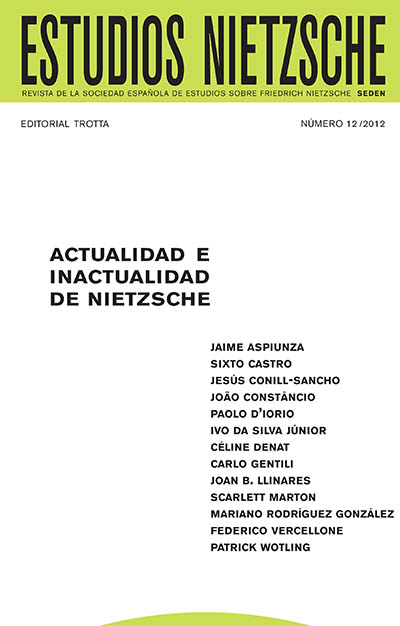Bells of Genoa
DOI:
https://doi.org/10.24310/EstudiosNIETen.vi12.10555Keywords:
eternal return, happiness, human thingsAbstract
This paper explores the different aspects which made the intellectual experience that Nietzsche had when he heard the bells of Genoa. At first we consider the three semantic levels of this illumination: biographical, literary and philosophical. Then we explore the development and the additional meanings of this epiphany through the continued appearance in his works. Thus, we analyze the semantic echoes of these images, as well as
references in and outside the text.
Downloads
Metrics
References
Barbera, S., La comunicazione perfetta. Wagner tra Feuerbach e Schopenhauer, Pisa, 1984.
Bernoulli, C. A., Franz Overbeck und Friedrich Nietzsche, Jena: Diederichs, 1908, I.
Deussen, P., Ricordi di Friedrich Nietzsche, Napoli: La scuola di Pitagora, 2010.. W
D'Iorio, P. , La linea e il circolo. Cosmologia e filosofia dell'eterno ritorno in Nietzsche, Genova: Pantograf, 1995.
D'Iorio, P. «L'annuncio dell'eterno ritorno in Cosí parlo Zarathustra»: en Cultura tedesca. Nietzsche 20 (2002), ed. S. Barbera, 85-97.
Emerson, R. W., Die Führung des Lebens. Gedanken und Studien, Leipzig: Steinacker, 1862.
Emerson. R. W., Versuche, Hannover: Carl Meyer, 1858.
Hartmann, E. von, Philosophie des Unbewussten. Versuch einer Weltanschauung, Berlin: Carl Duncker, 1869, vol. II.
Montnari, M., Su Nietzsche, Roma: Editori Riuniti, 1981.
Nietzsche, F., Obras Completas, I-IV (OC ). Director ed. Diego Sánchez Meca. Madrid: Tecnos, 2011-2016
Nietzsche, F., Correspondencia I-VI. (CO). Director ed. Luis E. de Santiago Guervós. Madrid : Trotta, 2005- 2012.
Nietzsche, F., Fragmentos Póstumos I-IV (FP). Director ed. Diego Sánchez Meca. Madrid: Tecnos, 2006-2010.
Platón, Leyes, 803b-d, cf. también 644d.
Platón, República, X, 604.
Schlechta, K., Nietzsche e il grande meriggio, Nápoles: Guida, 1998.
Schopenhauer, A., El mundo como voluntad y representación, trad., introd. y notas de Pilar López de santa María. Madrid: Trotta, vol. I, 22009.
Vivarelli V., Nietzsche und die Masken des freien Geistes. Montaigne, Pascal und Sterne, Würzbug: Konigshausen und Neumann, 1998.
Wagner, C., Tagebücher. Ediert und kommentiert von Martin Gregor-Dellin und Dietrich Mack, München: Piper, 1976-1977.
Zavatta, B., La sfida del carattere. Nietzsche lettore di Emerson, Roma: Editori Riuniti, 2006.
Downloads
Published
How to Cite
Issue
Section
License
As of issue 21 (2021) this journal is published only in open access (diamond route).
From that number 21, like the previous numbers published in NIETZSCHE STUDIES, they are subject to the Creative Commons Acknowledgment-NoComercia-ShareIgual 4.0 license, the full text of which can be consulted at <http://creativecommons.org/licenses/by-nc-sa/4.0 >
It is the responsibility of the authors to obtain the necessary permissions of the images that are subject to copyright.
This work is licensed under a Creative Commons Attribution-NonCommercial-ShareAlike 4.0 International License.
Copyright generates two different rights: moral rights and patrimonial rights that EJFB recognizes and respects. Moral rights are those relating to the recognition of the authorship. They are rights of a personal nature that are perpetual, inalienable, unseizable and imprescriptible as consequence of the indivisible union of the author and his/her work.
Patrimonial rights are those that can be derived from the reproduction, distribution, adaptation or communication of the work, among others.







11.png)
